Previous Millennial Health Leaders Summit

The Millennial Health Leaders Summit brings together a cadre of medical, public health, and public policy graduate students, nominated by their universities for their outstanding achievements and promise as future leaders in addressing health disparities across the nation.
About the 2014 Millennial Health Leaders Summit
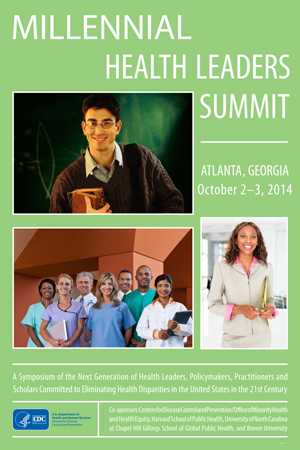
The Summit convenes a group of men and women who represent the next generation of leaders who will be able to take on the task of eliminating health disparities in the United States in the 21st century.
The 2014 Summit provided critical opportunities to consider issues and effective models for addressing health disparities in diverse populations.
The students engaged in interactive workshops and case study discussions given by health disparities researchers and policymakers within CDC.
The workshops included topics such as promoting health across all sectors; tribal health; social medicine and health disparities; and global health emergencies.
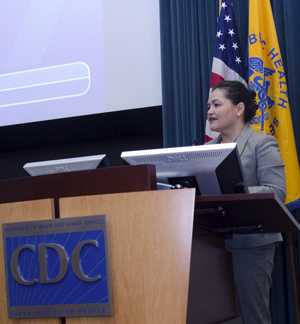 The case study workshops allowed students to delve into health disparities issues related to transportation, environmental justice, intimate partner violence, and tobacco disparities. They worked together in small groups to develop solutions to real health equity problems and presented proposed solutions. Students also participated in networking opportunities among themselves and with CDC staff.
The case study workshops allowed students to delve into health disparities issues related to transportation, environmental justice, intimate partner violence, and tobacco disparities. They worked together in small groups to develop solutions to real health equity problems and presented proposed solutions. Students also participated in networking opportunities among themselves and with CDC staff.
Full Sized Poster PDF
2014 Presentations
Opening Remarks
– Carmen Villar, Chief of Staff, CDC
Health Equity in the 21st Century Public Health
- Leandris C. Liburd, Director, Office of Minority Health and Health Equity, CDC
Breakout Sessions
Leadership and Developing your Career Path
– Liza Cariago-Lo, Harvard University and Dale Trevino, Brown University
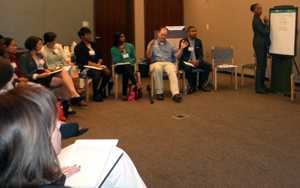 Engaging and Organizing Communities
Engaging and Organizing Communities
– Carolyn Jenkins, Medical University of South Carolina
Social Medicine, Health Disparities, and Servant Leadership
– Asim Jani, Center for Surveillance, Epidemiology and Laboratory Services
Global Health Emergencies: How we prepare, respond, and recover
– Julia Smith-Easley, Center for Global Health
Strategies for Reducing Health Disparities: Selected CDC-sponsored Interventions
- CAPT Holly Billie and Bethany West, National Center for Injury Prevention and Control,
Jeff Herbst and Thomas Painter, National Center for HIV/AIDS, Viral Hepatitis, STD, and TB Prevention
Health Doesn’t Happen in a Hospital, it Happens in Houses, Schools, and on Roadways: Working Across Sectors
– Chris Kochtitzky, National Center for Environmental Health and Nisha Botchwey, Georgia Institute of Technology
Connecting Land to Health: Participation with Tribes Addressing Social Determinants of Health, for the Health of the People
– Annabelle Allison, National Center for Environmental Health and Agency for Toxic Substances and Disease Registry
- Dawn Satterfield, National Center for Chronic Disease Prevention and Health Promotion

Case Studies
The Politics of Environmental Justice
– LaToria Whitehead, National Center for Environmental Health
Disparities in Sexually Transmitted Infections
– David Johnson, National Center for HIV/AIDS, Viral Hepatitis, STD, and TB Prevention
Tobacco Disparities
– Kevin Collins, National Center for Chronic Disease Prevention and Health Promotion
Integrating Public Health and Transportation Planning
– Chris Kochtitzky, National Center for Environmental Health
Addressing Inequities in Risk for Intimate Partner Violence
– Sara Patterson and Kirsten Rambo, National Center for Injury Prevention and Control
Addressing Community Health Through Partnerships and Collaborations
– Shannon White, National Center for Chronic Disease Prevention and Health Promotion
Closing Plenary
- John Auerbach, Office of the Associate Director for Policy, CDC
2014 Co-Sponsors
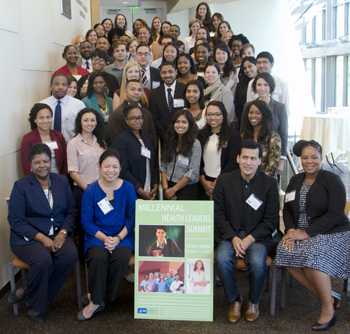
About the 2013 Millennial Health Leaders Summit
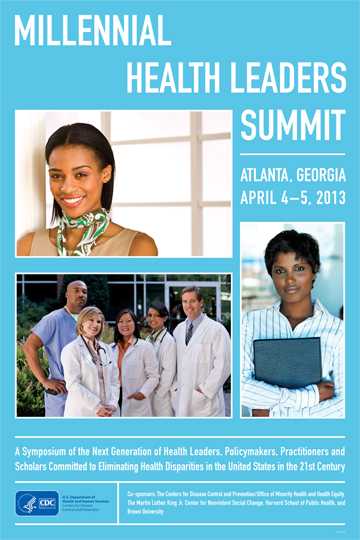 The goal of the Summit is to convene a group of men and women who represent the next generation of leaders who will be able to take on the task of eliminating health disparities in the United States in the 21st century. The 2013 Summit provided critical opportunities to consider issues and effective models for addressing health disparities in diverse populations.
The goal of the Summit is to convene a group of men and women who represent the next generation of leaders who will be able to take on the task of eliminating health disparities in the United States in the 21st century. The 2013 Summit provided critical opportunities to consider issues and effective models for addressing health disparities in diverse populations.
Through presentations from experts in the areas of health disparities and the social determinants of health, small group workshops and discussions about culturally-appropriate models, participants in the Summit received important information to prepare them for advancing the elimination of health disparities and address the social determinants of health in order to achieve health equity.
2013 Objectives
OMHHE's Objectives for the 2013 Summit were to:
- Describe the most recent national data available on racial and ethnic health disparities, and health disparities experienced by other selected population groups;
- Highlight current and future opportunities and challenges in addressing health disparities that these future leaders will encounter upon joining the public health, healthcare, and policy workforce;
- Introduce these future leaders to CDC’s investments in reducing health disparities;
- Examine evidence-based models and strategies for reducing health disparities across a range of health issues;
- Identify resources that will inform and enhance their work in the field;
- Promote networking and shared learning between CDC subject matter experts and future leaders; and
- Engage future leaders in collective problem-solving to identify innovative strategies for addressing health disparities and achieving health equity.
- This highly interactive event resulted in a unique experience of exploring how contemporary public health research, practice, and policies are developed, implemented and evaluated; raising questions about real world challenges and solutions with CDC scientists and practitioners and with their peers; and identifying how they might contribute to achieving a nation free of preventable health disparities.
2013 Presentations
Welcome/Opening Remarks - Ileana Arias, CDC/OD
Overview of Health Disparities - Vickie Boothe, EAPO
Breakout Session I ~ Knowledge, Skills, and Resources Development
Leadership in state & local health departments - Chelsea Payne & Kristin Brusuelas, OSTLTS
CDC Fellows and Training Opportunities - Quinn Lundquist, Brendan Jackson, Nathan Mork, SEPDPO, Jeffrey Walker, OSTLTS
Social Medicine Clinic 101 (Medical Students) - Asim Jani, SEPDPO
Breakout Sessions II & III ~ Putting Theories into Practice
Social Media, Health Disparities, and Health Literacy - Cynthia Baur, Amy Heldman, OADC
Community-based health equity programs - Pattie Tucker, Shannon White, Rick Dulin, NCCDPHP
Social Determinants of Health - Donna McCree, Mercedes Morales-Alemán, PhD, CAPT Laurie Reid, RN, MS, NCHHSTP
“Vulnerable Populations” – Who are they, why are they vulnerable, & what can we do? - Julio Dicent-Taillepierre, OMHHE
Violence as a Public Health Issue - Jeffrey Hall, NCIPC
Closing Plenary
“Health Disparities at the Intersection of Public Health & Health Care” - Asam Jani, MD, MPH
2013 Co-Sponsors
Health Equity Resources
Organizations:
- Joint Center for Political and Economic Studies, Place Matters Initiative
- PolicyLink, Center for Health Equity and Place
- Families USA
- National Association of County and City Health Officials (NACCHO), Health Equity and Social Justice
- Roots of Health Inequity
- World Health Organization, Global Health Observatory (GHO), Health Equity Monitor
Articles:
- Impatience of health professions students for health equity--can a new definition help?
- Addressing reproductive health disparities as a healthcare management priority: pursuing equity in the era of the Affordable Care Act
- Best Practices for Comprehensive Tobacco Control Programs: 2014
- Investing in health: why, what, and three reflections
- Primary and secondary syphilis among black and Hispanic men who have sex with men: case report data from 27 States
- Sex, health, and society: ensuring an integrated response
- Using community-based participatory approaches to mobilize communities for policy change
- Looking at environmental justice from an environmental health perspective
- Gender, Race, Class, and Health: Intersectional Approaches
Videos / Interactive Tools & Trainings:
- CDC Practitioner’s Guide for Advancing Health Equity
- Unnatural Causes Documentary
- The Center for Health Equity and Social Justice: Shifting the Public Health Paradigm
- Communities Taking Action: Profiles of Health Equity
- Health Equity and Prevention Primer
- Health Equity Training Series
- National Equity Atlas
- Page last reviewed: December 10, 2014
- Page last updated: December 10, 2014
- Content source:


 ShareCompartir
ShareCompartir